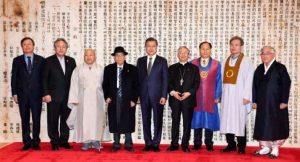For our own sake and for the sake of our fellow-beings, we have to be watchful of every step we take. Only by a high degree of mindfulness shall we succeed.
(Nyanaponika Thera)
Shortly after Britain declared war on Germany on 3 September 1939, the British government ordered the internment of all German nationals living in their Southeast Asian territories. It was feared that these “enemy aliens” could be spies or would be willing to assist the Nazis. One of the thousands of German nationals arrested and incarcerated was Siegmund Feniger, a Sri Lanka-ordained Buddhist monk better known today as Nyanaponika Thera. For the next six years, his “monastery” would be a British prisoner-of-war (POW) camp.
Feninger was born in Hanau, Germany, on 21 July 1901. His parents were Jewish and he was their only child. In 1921, the family relocated to Berlin, where Siegmund discovered books about Buddhism that captured his interest. He also learned that a German monk, Nyanatiloka Thera, had established a Buddhist monastery for Western monks on the island of Sri Lanka. Immediately, Feninger knew that he wanted to become a monk and join the community.
However, as an only child, Feninger was also devoted to his parents and was hesitant to simply leave them. His father died in 1932, about the same time that Adolf Hitler rose into power. Wanting to protect his mother from growing German anti-Semitism, Feninger arranged for her to live with relatives in Vienna in 1935. Only then did Feninger leave Europe for Sri Lanka in 1936, where he was eventually ordained as a Buddhist monk under Nyanatolika Thera and given the Dhamma name Nyanaponika Thera.
As attacks against Jewish people increased in Europe under the Nazis, Nyanaponika arranged for his mother to live in Sri Lanka. Under the influence of her son, she also embraced Buddhism and remained devoted to the path until her death in Colombo in 1956.
Nyanaponika’s arrest and incarceration as a German national took place in 1939. At first, he was held at a military camp in Sri Lanka before being relocated to a larger, more secure POW camp in northern India. In keeping with Buddhist teachings about accepting reality, however unpleasant and unwelcome, Nyanaponika adapted to his new situation by using his time as a POW to write books and translate Buddhist texts into German. When the war ended, Nyanaponika returned to his monastery in Sri Lanka. A few years later, in 1951, the Sri Lankan government granted him citizenship.
In 1957, Nyanaponika was approached by two Buddhist laymen who wanted to print a series of introductory books about Buddhism in English for free distribution abroad. Believing that the project was feasible and would be of benefit, he joined them. Originally, the three intended to issue a limited series of small, inexpensive books on basic Buddhist principles. However, the response to their initial printings was so overwhelmingly positive that the three abandoned their original limited aim in order to establish the Buddhist Publication Society (BPS). Nyanponika was its first president. From these humble beginnings, the BPS would emerge to become one of the world’s largest publishers of Buddhist literature.
Because Nyanaponika spent much of his time introducing Buddhism to Westerners, he was effective in clarifying the differences between Christianity and Buddhism. Nyanaponika was not in agreement that all religious paths lead to the same destination. He identified a sharp contrast between the Buddhist teaching and those of the Christian traditions, based on the opening words of the Dhammapada and the Bible.
In the Dhammapada, one of the most popular and influential Buddhist texts, the teaching of Buddha is on the mind. The text opens with these words:
All that we are is the result of what we have thought: it is founded on our thoughts, it is made up of our thoughts. If a man speaks or acts with an evil thought, pain follows him, as the wheel follows the foot of the ox that draws the carriage.
On the other hand, the Christian Bible begins with this sentence:
In the beginning, God created the heavens and the earth.
Commenting on these two openings in his book The Heart Of Buddhist Meditation, Nyanaponika writes: “Here the roads of these two religions part: one leads far away into an imaginary beyond, the other leads straight home, into man’s very heart,” adding “in the Buddhist doctrine, mind is the starting point, the focal point, and also the culminating point.”
Concerning mind development, Nyanaponika said that Buddhism teaches these three basics: To know the mind that is so near to us yet so unknown; to shape the mind that is so unwieldy and obstinate yet so pliant; and to free the mind that is in bondage all over, and yet may win freedom here and now.
When Westerners stated that Buddhism is “atheistic,” Nyanaponika objected to that description, saying:
Buddhism has sometimes been called an atheistic teaching, either in an approving sense by freethinkers and rationalists, or in a derogatory sense by people of theistic persuasion. Only in one way can Buddhism be described as atheistic, namely, in so far as it denies the existence of an eternal, omnipotent God or godhead who is the creator and ordainer of the world. The word “atheism,” however, like the word “godless,” frequently carries a number of disparaging overtones or implications, which in no way apply to the Buddha’s teaching.
Finally, to those who saw Buddhism as overly focused on suffering, Nyanaponika responded as a Buddhist teacher of joy:
Life, though full of woe, holds also sources of happiness and joy, unknown to most. Let us teach people to seek and to find real joy within themselves and to rejoice with the joy of others! Let us teach them to unfold their joy to ever sublimer heights! Noble and sublime joy is not foreign to the Teaching of the Enlightened One. Wrongly, the Buddha’s Teaching is sometimes considered to be a doctrine diffusing melancholy. Far from it: the Dhamma leads step by step to an ever purer and loftier happiness.
Over the course of his life, Nyananponika was the recipient of many honors: Distinguished Patron of the Buddhist Publication Society, Honorary Member of the German Oriental Society, and Honorary Doctor of Letters and Literature from several Sri Lankan universities. He passed away on 19 October 1994, on the grounds of his beloved island hermitage. He had been a Buddhist monk for 58 years.
Nyanaponika was one of those unique individuals who, thanks to the causes and conditions of his context as well as his own initiative, lived a trailblazing life. He chose a life of vocation and a calling that went far beyond a career. Not only was he one of the first true Western Buddhist monks, he was also among the most influential, respected for his strict practice, fidelity to the teachings he received, and his rigorous translation. He published prolifically. Even today he is upheld as among the foremost modern authorities on the Theravada tradition.
Words of wisdom from Nyanaponika Thera
The dark, untidy corners of the mind are the hideouts of our most dangerous enemies. From there they attack us unawares, and much too often succeed in defeating us.
Mind is the fount of all the good and evil that arises within and befalls us from without.
It is one of the few consolations in this disconsolate world, that not only evil, but the good have a strong infectious power that will show itself increasingly if only we have the courage to put it to the test.
By facing one’s own defilements one will be stirred to increase the effort to eliminate them. On the other hand, if out of a false shame or pride one tries to avert one’s glance when they arise, one will always evade the final and decisive encounter.
Repeated gratification turns a desire into a habit, and habit left unchecked grows into compulsion.
Right meditation is not escapism; it is not meant to provide hiding-places for temporary oblivion. Realistic meditation has the purpose of training the mind to face, to understand and to conquer this very world in which we live.
Meet your defilements with a free and open glance! Be not ashamed, afraid or discouraged!
Mindfulness, though seemingly of a passive nature, is in fact an activating force. It makes the mind alert, and alertness is indispensable for all purposeful activity.
In an untrained mind, noble tendencies and right thoughts are often assailed by the sudden outbreak of passions and prejudices.
Sustained attention not only provides the nourishing soil for the growth of intuition, it also makes possible the fuller utilization and even repetition of the intuitive moment.
A momentary impulse, an occasional indulgence, a passing whim may by repetition become a habit we find difficult to uproot, a desire hard to control, and finally an automatic function we no longer question.
Detrimental physical or mental habits may grow strong, not only if fostered deliberately, but also if left unnoticed or unopposed.
Having the comfort of a “secure footing” in life, we too easily forget to walk on. Instead, we prefer to “strengthen our position,” to improve and embellish the little cage we build for ourselves out of habits, ideas and beliefs.
To cross the ocean of life and reach “the other shore” safely, skill is needed in navigating its currents and cross-currents.
An appeal for the reduction of hate and violence in the world of today can no longer be dismissed as unrealistic moralizing. For the individual and for mankind, it has now become a question of survival, physically and spiritually.
Related features from BDG
How I Became a Theravada Buddhist
A Reminiscence About My Theravada Teachers














